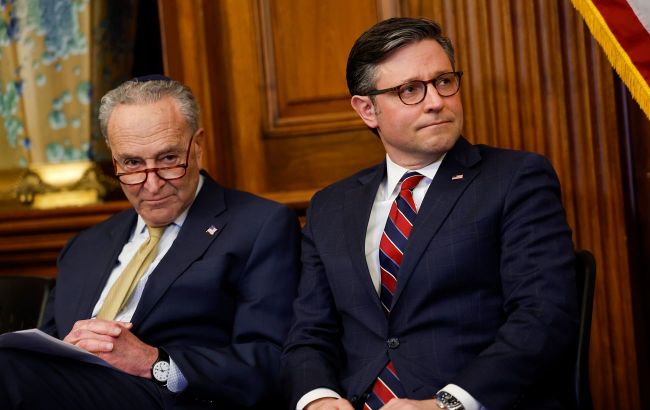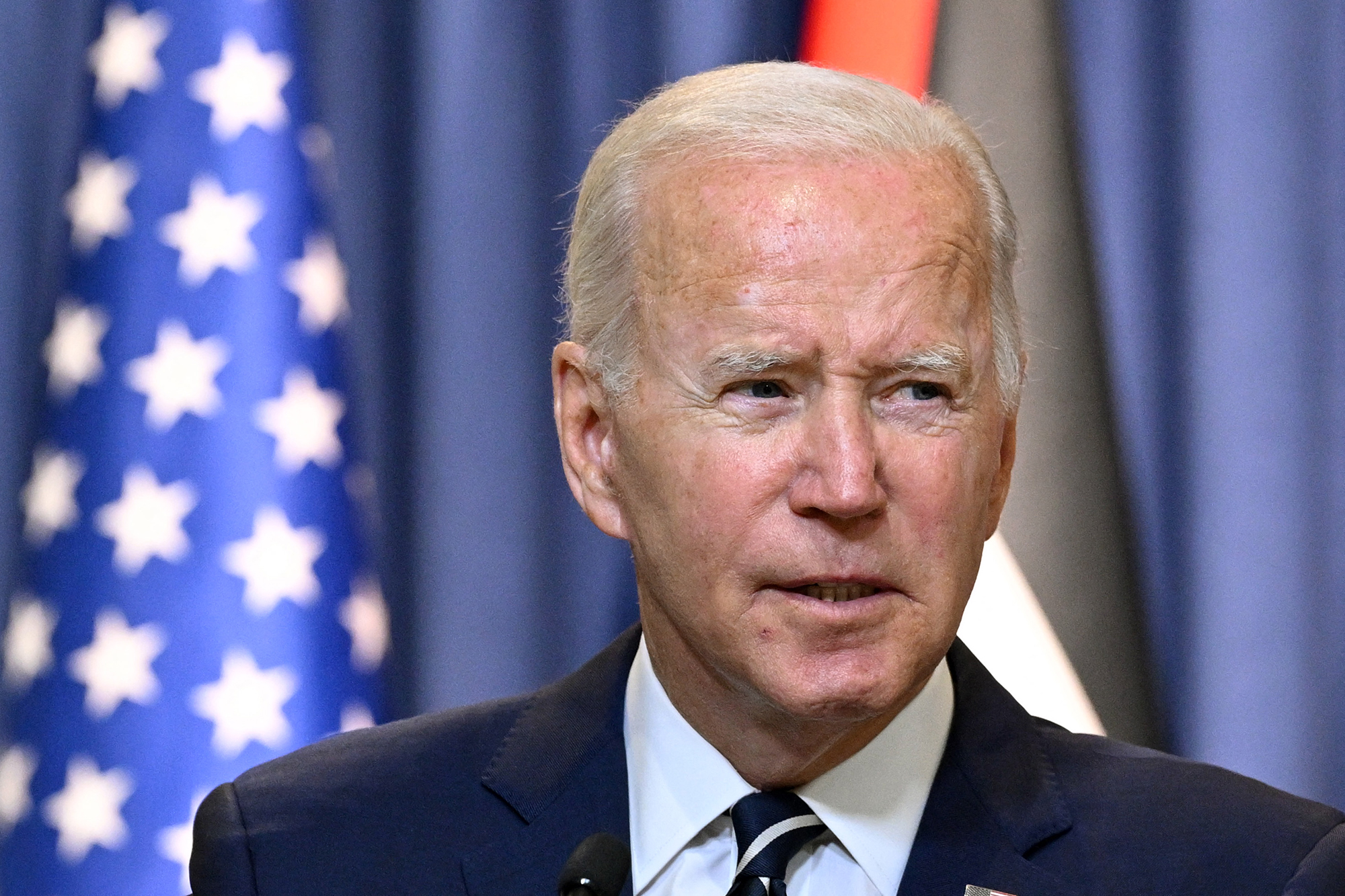U.S. Congress back in session: Budget talks and aid prospects for Ukraine before deadline
 Senate Democratic leader Chuck Schumer and House spokesman Mike Johnson (Photo: Getty Images)
Senate Democratic leader Chuck Schumer and House spokesman Mike Johnson (Photo: Getty Images)
The American Congress seems close to agreeing on the federal budget for 2024. Senate and House leaders have agreed on the main parameters, but due to the position of some Republicans, there is still a threat of a shutdown after January 19.
More about this and why the lack of agreement on the southern border in the U.S. is blocking not only the budget but also the multi-billion aid to our country can be found in the material by RBC-Ukraine.
In preparing the article, material from Politico, The Washington Post, The New York Times, The Hill, and a press release on the White House website were used.
The federal budget deal is in place. However, extreme Republicans are against it
Leaders of the Senate and the House of Representatives reached a comprehensive agreement on state funding for the fiscal year 2024. Yet it remains unclear whether they can formalize this into law, as there are less than two weeks left before a partial shutdown. Both chambers are reconvening after the New Year break.
According to the agreement, the total spending amount is set at $1.66 trillion. This includes an increase in Pentagon spending to $886.3 billion and non-military sector funding at $772.7 billion. Despite Republican demands to cut the budget, spending on key domestic and social programs remains intact.
"By securing the $772.7 billion for non-defense discretionary funding, we can protect key domestic priorities like veterans benefits, health care and nutrition assistance from the draconian cuts sought by right-wing extremists," stated Senate Democratic Majority Leader Chuck Schumer.
He labels the agreement as a "good deal for Democrats and the country" and emphasizes that Congress will need to apply a bipartisan approach to avoid a destructive shutdown.
House Republican Majority Leader Speaker Mike Johnson, in a letter to congressmen, highlighted a reduction of $10 billion in spending for the Internal Revenue Service (IRS) and the cancellation of a $6 billion package to deal with the consequences of the COVID-19 pandemic. According to him, this reflects actual taxpayer money savings and reductions in federal bureaucracy. He also views the current agreement as the best among those Republicans have made in recent years. However, he acknowledges that not everyone will be satisfied as spending cuts are not as significant as many of his party members desired.

Photo: Speaker of the House of Representatives Mike Johnson believes the agreement on the federal budget is the best that Republicans have made in recent years (Getty Images)
Now the legislators need to work extremely quickly. The first deadline for federal appropriations for agriculture, transportation, energy, and veterans' affairs is January 19. The second, for funding the rest, including the Pentagon's major programs, is February 2.
The deal is likely to face opposition from far-right Republicans in the House who were counting on significant budget cuts.
"I fear that there will ultimately be a deal that’s bad for the country. It’s bad for the American people, that’s bad for the deficit and bad for the national debt," said Bob Good, chair of the ultra-conservative House Freedom Caucus and a Virginia Republican.
His faction has already called the deal a "total failure" and "totally unacceptable."
Biden demands the budget be passed and moves to billions for Ukraine. What's the issue?
The likelihood of a shutdown, as before, is high as Congressional leaders need to resolve complex political issues in a very limited time. Finding a way out of the Republican ultimatum, which blocks a $106 billion aid package for Ukraine, Israel, and Taiwan, is crucial.
According to Shalanda Young, director of the White House Office of Management and Budget, Republicans are working to prevent a shutdown. However, Mike Johnson faces criticism within his own party, complicating negotiations and increasing the risk of failure. Johnson himself anticipates bipartisan debates on several political issues, including abortion funding.
It's worth noting that the main figures are not tied to Biden's request for billions for Ukraine. Attempts are being made to tie his separate request to changes in border and immigration policy. As for the federal budget agreement, the President of the United States has approved the spending program.
“It reflects the funding levels that I negotiated with both parties and signed into law last spring. It rejects deep cuts to programs hardworking families count on, and provides a path to passing full-year funding bills that deliver for the American people and are free of any extreme policies... Now, congressional Republicans must do their job, stop threatening to shut down the government, and fulfil their basic responsibility to fund critical domestic and national security priorities, including my supplemental request. It’s time for them to act," Biden noted.
 Photo: Joe Biden demands Republicans to "do the job" (Getty Images)
Photo: Joe Biden demands Republicans to "do the job" (Getty Images)
The current agreement essentially aligns with the deal that was struck with the previous House Speaker Kevin McCarthy. In the spring of 2023, he negotiated with the Biden administration to suspend the national debt limit in exchange for limiting expenditures to $1.59 trillion in 2024. However, far-right Republicans were against it, leading to his resignation in the fall.
For Speaker Mike Johnson, the $1.66 trillion deal could be a significant initial success. However, the issue of the southern border and illegal migration remains a serious hurdle, both for the federal budget and aid to Ukraine.
"A Draconian" law against migrants. What Republicans insist on
It's worth noting that Republicans insist on passing House Resolution 2 - a radical bill that sharply restricts granting asylum to migrants. They believe it's necessary to prevent hundreds of thousands of illegals from crossing the southern border. They are trying to tie this bill to Democratic priorities, such as aid to Ukraine or the passage of the federal budget.
"Joe Biden, Kamala Harris, and everybody else. They do not want to do the simple job of securing the border, and so now, when you have a massive catastrophe which they created, now they’re going down to Mexico to see what can be done. The answer is simple, follow House Republicans’ H.R. 2. It’s the plan," stated Republican Congressman Byron Donalds of Florida.
In response, Democrats cite their unwillingness to compromise on their values. According to Congressman Greg Meeks from New York, some things need to be addressed at the border, but not by the methods proposed by Republicans.
The "Draconian" bill contains several innovations:
Labor market. Employers could face imprisonment if they fail to verify their employees' documentation using the E-Verify system. Currently, this system is mandatory in 22 states, but there are no federal requirements yet. However, there's uncertainty about whether such measures would cleanse the labor market of illegal workers.
According to a Southern Economic Journal study, in states using E-Verify, wages for illegal male workers decreased, but employment for illegal female workers, often hired for domestic work, increased. Moreover, according to US government data, approximately 57,000 citizens were mistakenly flagged as lacking documentation. Additionally, such controls could critically impact the agricultural sector, where about 40% of workers indeed lack proper documentation.
 Photo: Republican congressmen demand strengthening immigration law (oig.dhs.gov)
Photo: Republican congressmen demand strengthening immigration law (oig.dhs.gov)
Asylum: According to current legislation, migrants who apply for asylum can remain in the U.S. while their application is being processed. Republicans liken this policy of the White House to an open invitation for migrants.
HR2 bill restricts the right to seek asylum only if a Customs and Border Protection officer doesn't believe the application will be approved. It also introduces a $50 fee and limits application submission to entry points. The bill allows detention, even for cases that take many years to resolve.
One of the co-authors, a Republican from California, Tom McClintock, explained the strengthening of norms by claiming that school classes are allegedly overrun by students who don't speak English, and hospitals are crowded with undocumented individuals demanding free assistance.
"These are not asylum-seekers. Asylum is not an open invitation to bum rush our borders. But the Democrats have made it precisely that," he said.
Wall construction: The bill demands the federal government fortify at least 900 miles of the approximately 2000-mile U.S.-Mexico border, reviving ambitious plans from the Trump era. The proposal includes allocating $110 million annually to border forces created in states and prohibits asylum seekers from using documents issued by the Department of Homeland Security (DHS) for boarding flights.
Repealing protection for migrant children: The bill cancels certain measures that protect minors. It reinstates indefinite family detention and makes it more difficult for unaccompanied minors to claim migrant status.
This would also expedite the deportation of children, extend the period they can be held in adult facilities at the border from 3 to 30 days, and prohibit states from setting their own requirements for these detention places. The most radical step is that the Health and Human Services Department must provide detailed information about sponsors accepting migrant children. If documents are absent, deportation proceedings begin within 30 days.
An agreement this week? What is being said about aid to Ukraine in the Senate and House of Representatives


